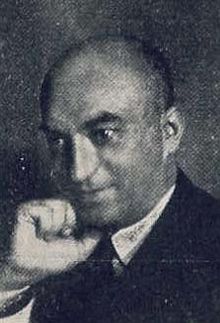fiction.wikisort.org - Writer
Kálmán Kalocsay (Hungarian pronunciation: [ˈkaːlmaːn ˈkɒlot͡ʃɒi]; 6 October 1891 in Abaújszántó – 27 February 1976) was a Hungarian Esperantist poet, translator and editor who considerably influenced Esperanto culture, both in its literature and in the language itself, through his original poetry and his translations of literary works from his native Hungarian and other languages of Europe. His name is sometimes Esperantized as Kolomano Kaloĉajo, and some of his work was published under various pseudonyms, including C.E.R. Bumy, Kopar, Alex Kay, K. Stelov, Malice Pik and Peter Peneter.
This article may be expanded with text translated from the corresponding article in Hungarian. (November 2010) Click [show] for important translation instructions.
|

Kalocsay studied medicine and later became a surgeon and the chief infectious disease specialist at a major Budapest hospital. He learned both Esperanto and its breakaway dialect Ido in his adolescence but became more inclined towards Esperanto after he had seen its greater literary potential. In 1921 his first original collection of poems, Mondo kaj Koro (“World and heart”) was published. A further decade passed before the appearance of his collection Streĉita Kordo (“A taut string”), which many Esperantists consider as one of the finest collections of original Esperanto poetry, and Rimportretoj (“Portraits in rhyme”), witty poems in rondel style about various people then prominent in the Esperanto movement. In 1932, under the pseudonym Peter Peneter, he published Sekretaj Sonetoj (“Secret sonnets”), a book of erotic verse.
Kalocsay guided the Esperanto literary world through the magazine and publishing house called Literaturo Mondo (“Literary world”). A group of writers who coalesced around this magazine during the 1920s and 1930s was known as the Budapeŝto skolo (“Budapest school”).
Works of Kalocsay about literary and linguistic theory include the expansive Plena Gramatiko de Esperanto (“Complete grammar of Esperanto”) and Parnasa Gvidlibro (“Handbook of Parnassus”), a work on Esperanto poetics co-authored with Gaston Waringhien, and an academic style guide for Esperanto, Lingvo – Stilo – Formo (“Language, style and form”). Kalocsay also co-compiled the two-volume Enciklopedio de Esperanto (“Encyclopædia of Esperanto”).
Much was written about Kalocsay by his literary executor Ada Csiszár, after whose death the estate passed to the Esperanto museum of the Austrian National Library.
See also
- Julio Baghy
Further reading
- In Memoriam Kalocsay Kálmán Csiszár Ada, Budapest, 1994 (in Hungarian)
- Omaĝe al Kálmán Kalocsay 1 – 9 kötet, Csiszár Ada, Budapest, 1998 – 2006 (in Esperanto)
External links
- Works by Kálmán Kalocsay at Project Gutenberg
- Kalman Kalocsay - a brief biography at the Wayback Machine (archived October 27, 2009)
- Kalman Kalocsay's poetry in English at Poems Found in Translation
- Guerrero, Javier (2012). "Kalocsay, masonisto de la Parnaso" (PDF). La Ondo de Esperanto (in Esperanto) (3 (209)): 16.
На других языках
- [en] Kálmán Kalocsay
[es] Kálmán Kalocsay
Kálmán Kalocsay (6 de octubre de 1891-27 de febrero de 1976) fue uno de los personajes más famosos en la historia del esperanto puesto que fue uno de los poetas y escritores más prolíficos en esa lengua. También escribió en húngaro.[fr] Kálmán Kalocsay
Kálmán Kalocsay (prononcé /ˈkaːlmaːn ˈkɒloʧai/) (1891-1976), est un poète, rédacteur et traducteur en espéranto, dont il a beaucoup influencé l'évolution de la littérature. Il a contribué à la réalisation de l’Encyclopédie de l'espéranto. Son nom est souvent abrégé en Kolomano, en espéranto.[ru] Калочаи, Кальман
Ка́льман Ка́лочаи (венг. Kalocsay Kálmán, в русском языке фамилия трансскрибируется и как Калочай, на эсперанто иногда используется полностью эсперантизированный вариант имени Kolomano Kaloĉajo; 6 октября 1891 — 27 февраля 1976) — поэт и переводчик на языке эсперанто, теоретик грамматики и словообразования эсперанто. По национальности венгр. Эсперантской литературоведческой традицией признан наиболее значительным поэтом на эсперанто.Другой контент может иметь иную лицензию. Перед использованием материалов сайта WikiSort.org внимательно изучите правила лицензирования конкретных элементов наполнения сайта.
WikiSort.org - проект по пересортировке и дополнению контента Википедии